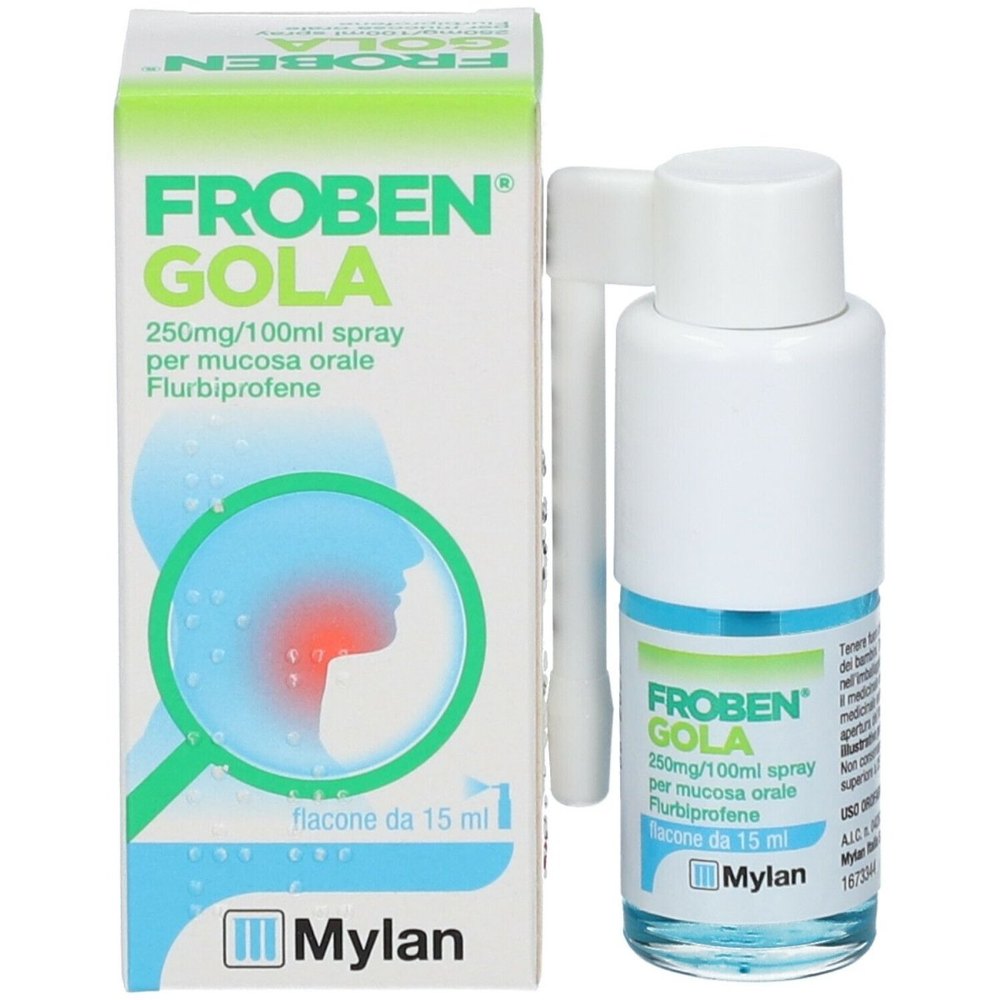
Froben Gola Spray is an over-the-counter drug based on Flurbiprofen indicated for the symptomatic treatment of irritative-inflammatory conditions associated with pain in the oropharyngeal cavity.
Flurbiprofen belongs to a group of medicines called nonsteroidal anti-inflammatory drugs (NSAIDs), used to relieve pain, redness, heat and swelling in the presence of inflammatory processes. For this reason, Froben Gola Spray is used to reduce burning, redness, pain and inflammation of the mouth and throat , due to gingivitis, stomatitis, pharyngitis and as a consequence of conservative or extractive dental therapy .
ACTIVE INGREDIENTS
Active ingredients contained in Froben Gola Spray Oral Mucosa 15 ml Flurbiprofen 0.25% - What is the active ingredient of Froben Gola Spray Oral Mucosa 15 ml Flurbiprofen 0.25%?
Froben Gola 250 mg/100 ml Mouthwash, 100 ml of solution contain, active ingredient: flurbiprofen 0.25 g. Excipients with known effect: 40-polyoxyethylened hydrogenated castor oil, ethanol, mint essence flavour (containing limonene). Froben Gola 250 mg/100 ml Oral mucosa spray, 100 ml of solution contain, active ingredient: flurbiprofen 0.25 g. Excipients with known effect: 40-polyoxyethylened hydrogenated castor oil, ethanol, mint essence flavour (containing limonene). For the full list of excipients, see section 6.1.
EXCIPIENTS
Composition of Froben Throat Spray Oral Mucosa 15 ml Flurbiprofen 0.25% - What does Froben Throat Spray Oral Mucosa 15 ml Flurbiprofen 0.25% contain?
Purified water, ethanol, patent blue V (E131), glycerol, mint essence flavouring (containing limonene), 40-polyoxyethylened hydrogenated castor oil, potassium bicarbonate, sodium saccharinate, sorbitol.
DIRECTIONS
Therapeutic indications Froben Gola Spray Oral Mucosa 15 ml Flurbiprofen 0.25% - Why is Froben Gola Spray Oral Mucosa 15 ml Flurbiprofen 0.25% used? What is it used for?
Froben Gola is indicated for the symptomatic treatment of irritative-inflammatory conditions also associated with pain in the oropharyngeal cavity (e.g. gingivitis, stomatitis, pharyngitis), also as a consequence of conservative or extractive dental therapy.
CONTRAINDICATIONS SIDE EFFECTS
Contraindications Froben Gola Spray Oral Mucosa 15 ml Flurbiprofen 0.25% - When should Froben Gola Spray Oral Mucosa 15 ml Flurbiprofen 0.25% not be used?
Hypersensitivity to flurbiprofen or to any of the excipients listed in section 6.1. Froben Gola is also contraindicated in: patients who have previously shown hypersensitivity reactions (e.g. asthma, urticaria) after taking aspirin or other NSAIDs; patients with a history of gastrointestinal bleeding or perforation related to previous NSAID therapy; patients with active or history of ulcerative colitis, Crohn's disease, recurrent peptic ulcer or gastrointestinal bleeding (defined as two or more distinct episodes of proven ulceration or bleeding); patients with severe cardiac, renal or hepatic insufficiency (see section 4.4). Froben Gola is contraindicated during the third trimester of pregnancy.
DOSAGE
Quantity and method of taking Froben Gola Spray Mucosa Orale 15 ml Flurbiprofene 0.25% - How do you take Froben Gola Spray Mucosa Orale 15 ml Flurbiprofene 0.25%?
The lowest effective dose should be used for the shortest duration necessary to relieve symptoms (see section 4.4). It is recommended to use this medicine for a maximum of three days. Dosage. Mouthwash: the recommended dose is two or three rinses or gargles per day with 10 ml of mouthwash. It can be diluted in water. Spray for oral mucosa: the recommended dose is 2 sprays 3 times a day directed directly at the affected area. Paediatric population: there are no adequate data available on the paediatric population; therefore, the use of the medicine is not recommended. Method of administration: the use of Froben Gola is exclusively for local oral use and must not be swallowed.
CONSERVATION
Storage Froben Throat Spray Oral Mucosa 15 ml Flurbiprofen 0.25% - How is Froben Throat Spray Oral Mucosa 15 ml Flurbiprofen 0.25% stored?
Mouthwash: This medicine should not be stored above 25 degrees C. Oral mucosa spray: This medicine should not be stored above 25 degrees C. Keep the bottle in the outer carton in order to protect from light.
WARNINGS
Warnings Froben Gola Spray Oral Mucosa 15 ml Flurbiprofen 0.25% - About Froben Gola Spray Oral Mucosa 15 ml Flurbiprofen 0.25% it is important to know that:
At the recommended doses, any swallowing of FROBEN GOLA does not cause any harm to the patient as these doses are much lower than those of the single dosage of the product for systemic use. The use of Froben Gola, especially if prolonged, may give rise to phenomena of sensitization or local irritation; in such cases the treatment should be interrupted and, if necessary, appropriate therapy should be instituted. General precautions: flurbiprofen should not be used for prolonged treatments. It is necessary to inform patients to seek medical advice if after short periods of treatment there are no appreciable results. Undesirable effects can be minimised by using the lowest effective dose for the shortest duration of treatment necessary to control symptoms (see section 4.2 and the sections below on gastrointestinal and cardiovascular risks). Use in elderly patients: elderly patients have an increased frequency of adverse reactions to NSAIDs, especially gastrointestinal bleeding and perforation, which may be fatal. Gastrointestinal effects: Flurbiprofen should be administered with caution to patients with a history of peptic ulcer and other gastrointestinal disease as these conditions may be exacerbated. Gastrointestinal bleeding, ulceration or perforation have been reported with all NSAIDs at any time during treatment. These adverse events can be fatal and may occur with or without warning symptoms or with a previous history of serious gastrointestinal events. The risk of gastrointestinal bleeding, ulceration or perforation is higher with increasing flurbiprofen dosage in patients with a history of ulcer, particularly if complicated with haemorrhage or perforation and in the elderly. These patients should start treatment on the lowest available dose. Concomitant use of protective agents (misoprostol or proton pump inhibitors) should be considered for these patients and also for patients taking low dose aspirin or other drugs likely to increase the risk of gastrointestinal events (see section below and section 4.5). Patients with a history of gastrointestinal disease, particularly when elderly, should report any unusual abdominal symptoms (especially gastrointestinal bleeding) in the initial stages of treatment. When gastrointestinal bleeding or ulceration occurs in patients receiving Froben Gola, the treatment should be withdrawn. Caution should be advised in patients receiving concomitant medications which could increase the risk of ulceration or bleeding, such as oral corticosteroids, anticoagulants such as warfarin, selective serotonin reuptake inhibitors or anti-platelet agents such as acetylsalicylic acid (see section 4.5). In case of concomitant intake of alcohol, the undesirable effects related to the active substance, particularly those involving the gastrointestinal tract or the central nervous system, may be increased with the use of NSAIDs. Respiratory disorders: cases of bronchospasm have been reported with flurbiprofen in patients with a history of bronchial asthma. Cardiac, renal and hepatic impairment: Particular caution should be exercised when treating patients with severely impaired renal, cardiac or hepatic function, as the use of NSAIDs may result in deterioration of renal function. In such patients the dosage should be kept as low as possible and renal function should be monitored. Administration of an NSAID may cause a dose-dependent reduction in prostaglandin formation, precipitating renal failure. Patients at highest risk of developing this reaction are those with impaired renal function, cardiac insufficiency and hepatic dysfunction, those taking diuretics and the elderly. Renal function should be monitored in these patients (see also section 4.3). Flurbiprofen should be administered with caution in patients with a history of cardiac insufficiency or hypertension since cases of oedema have been reported in association with flurbiprofen administration. Central nervous system effects: Headache may occur with prolonged use of any analgesic and should not be treated by increasing the dosage of the medicinal product. Cardiovascular and cerebrovascular effects: Appropriate monitoring and advice are necessary in patients with a history of hypertension and/or mild to moderate congestive heart failure since fluid retention and oedema have been reported in association with flurbiprofen administration and NSAID treatment. Froben Gola should be used with caution in these patients. Clinical trial and epidemiological data suggest that the use of some NSAIDs, particularly at high doses and in long-term treatment, may be associated with a small increased risk of arterial thrombotic events, such as myocardial infarction or stroke. There are insufficient data to exclude a similar risk for flurbiprofen. Patients with uncontrolled hypertension, congestive heart failure, established ischaemic heart disease, peripheral arterial disease and/or cerebrovascular disease should only be treated with flurbiprofen after careful consideration. Similar consideration should be made before initiating long-term treatment in patients with risk factors for cardiovascular disease (e.g. hypertension, hyperlipidaemia, diabetes mellitus, smoking). Skin reactions: Serious skin reactions, some of them fatal, including exfoliative dermatitis, Stevens-Johnson syndrome, and toxic epidermal necrolysis, have been reported very rarely in association with the use of NSAIDs. Patients appear to be at highest risk early in the course of therapy: the onset of the reaction occurring in the majority of cases within the first month of treatment. Flurbiprofen should be discontinued at the first appearance of skin rash, mucosal lesions, or any other sign of hypersensitivity. Renal effects: Caution should be exercised when initiating treatment with NSAIDs such as flurbiprofen in patients with considerable dehydration.
INTERACTIONS
Interactions Froben Gola Spray Mucosa Orale 15 ml Flurbiprofene 0.25% - Which medicines or foods can modify the effect of Froben Gola Spray Mucosa Orale 15 ml Flurbiprofene 0.25%?'
Caution should be exercised in patients treated with any of the following medicinal products, as interactions have been reported in some patients. Diuretics, ACE inhibitors and angiotensin II antagonists: NSAIDs may reduce the effect of diuretics and other antihypertensive drugs. Diuretics may also increase the risk of nephrotoxicity of NSAIDs. In some patients with compromised renal function (e.g. dehydrated patients or elderly patients with compromised renal function) the co-administration of an ACE inhibitor or an angiotensin II antagonist and agents that inhibit the cyclo-oxygenase system may lead to further deterioration of renal function, including possible acute renal failure, which is usually reversible. These interactions should be considered in patients taking flurbiprofen concomitantly with ACE inhibitors or angiotensin II antagonists. Therefore, the combination should be administered with caution, especially in elderly patients. Patients should be adequately hydrated and consideration should be given to monitoring renal function after initiation of concomitant therapy and periodically thereafter. Lithium salts: decreased lithium elimination. Methotrexate: caution is advised when co-administering flurbiprofen and methotrexate since NSAIDs may increase methotrexate levels and thus its toxic effects. Anticoagulants, such as warfarin: increased anticoagulant. Anti-platelet agents: increased risk of gastrointestinal bleeding (see section 4.4). Selective serotonin reuptake inhibitors (SSRIS): increased risk of gastrointestinal bleeding. Acetylsalicylic acid (Aspirin): as with other NSAID-containing medicinal products, concomitant administration of flurbiprofen and aspirin is generally not recommended due to the potential for increased adverse effects (see section 4.4). Cardiac glycosides: NSAIDs may exacerbate cardiac failure, reduce glomerular filtration rate and increase plasma levels of cardiac glycosides. Ciclosporins: Increased risk of nephrotoxicity with NSAIDs. Corticosteroids: Increased risk of gastrointestinal ulceration or haemorrhage with NSAIDs. Cox-2 inhibitors and other NSAIDs: Concomitant use of other NSAIDs, including cyclooxygenase-2 selective inhibitors, should be avoided due to potential additive effects. Mifepristone: NSAIDs should not be taken for 8-12 days after mifepristone administration since NSAIDs may reduce the effects of mifepristone. Quinolone antibiotics: Results from animal studies suggest that NSAIDs may increase the risk of convulsions associated with the use of quinolone antibiotics. Patients taking NSAIDs and quinolones may have an increased risk of developing convulsions. Tacrolimus: possible increased risk of nephrotoxicity in case of co-administration with NSAIDs. Zidovudine: increased risk of haematotoxicity in case of co-administration with NSAIDs. There is evidence of an increased risk of haemarthrosis and haematoma in haemophiliac patients affected by HIV in concomitant treatment with Zidovudine and other NSAIDs. The interactions reported above have been reported in particular after the administration of flurbiprofen-based formulations for systemic use. At the recommended doses of Froben Gola no interactions with other medicinal products or other types have been reported. In any case, inform your doctor if you are taking other medicines.
SIDE EFFECTS
Like all medicines, Froben Gola Spray Mucosa Orale 15 ml Flurbiprofene 0.25% can cause side effects - What are the side effects of Froben Gola Spray Mucosa Orale 15 ml Flurbiprofene 0.25%?
The following adverse reactions, reported in particular after administration of systemic formulations, are reported according to the MedDRA classification. Frequency groupings are classified according to the following convention: very common (>= 1/10), common (>= 1/100, <1/10), uncommon (>= 1/1000, <1/100), rare (>= 1/10 000, <1/1 000), very rare (<1/10 000) and not known (frequency cannot be estimated from the available data). Blood and lymphatic system disorders: Uncommon: anaemia; very rare: leucopenia, agranulocytosis, aplastic anaemia, neutropenia, thrombocytopenia, haemolytic anaemia. Immune system disorders: Uncommon: hypersensitivity; rare: anaphylactic reaction. Psychiatric disorders: Rare: depression, confusional state; very rare: hallucination. Nervous system disorders. Common: migraine, dizziness; uncommon: paraesthesia; rare: somnolence, insomnia; not known: optic neuritis, cerebrovascular accident, aseptic meningitis, headache. Eye disorders. Uncommon: visual disturbances. Ear and labyrinth disorders. Uncommon: tinnitus, vertigo. Respiratory, thoracic and mediastinal disorders. Uncommon: asthma, dyspnoea; rare: bronchospasm. Gastrointestinal disorders. Common: dyspepsia, diarrhoea, nausea, vomiting, abdominal pain, flatulence, constipation, melaena, haematemesis, gastrointestinal haemorrhage; uncommon: gastritis, duodenal ulcer, gastric ulcer, mouth ulcer, gastrointestinal perforation; very rare: pancreatitis; not known: colitis and Crohn's disease. Hepatobiliary disorders. Very rare: jaundice, cholestatic jaundice, abnormal liver function; not known: hepatitis. Skin and subcutaneous tissue disorders. Uncommon: rash, urticaria, pruritus, purpura, angioedema, photosensitivity reactions; very rare: severe forms of bullous skin reactions (e.g. erythema multiforme, Stevens-Johnson syndrome and toxic epidermal necrolysis). Renal and urinary disorders. Rare: nephrotoxicity in various forms. Interstitial nephritis, nephrotic syndrome, renal failure and acute renal failure (see section 4.4); not known: glomerulonephritis. General disorders and administration site conditions. Common: fatigue, malaise, oedema. Cardiac disorders. Uncommon: cardiac failure. Vascular disorders. Uncommon: hypertension. Investigations. Common: liver function test abnormal, prolonged bleeding time. Metabolism and nutrition disorders. Common: fluid retention. Immune system disorders. Hypersensitivity reactions have been reported following treatment with flurbiprofen. These consist of: a) non-specific allergic reactions and anaphylaxis; b) respiratory tract reactions including asthma, including severe asthma, bronchospasm or dyspnoea, or c) various skin disorders, such as rashes of various types, pruritus, urticaria, purpura, angioedema and, very rarely, exfoliative and bullous dermatitis (including toxic epidermal necrolysis and erythema multiforme). Cardiac and vascular disorders: Cases of oedema, hypertension and cardiac failure have been reported in association with treatment with NSAIDs. Clinical trial and epidemiological data suggest that the intake of some NSAIDs (particularly at high doses and in case of long-term treatment) may be associated with an increased risk of arterial thrombotic events (for example myocardial infarction or stroke) (see section 4.4). Nervous System Disorders: aseptic meningitis (especially in patients with existing autoimmune disorders such as systemic lupus erythematosus and connective tissue disorders) with symptoms such as stiff neck, headache, nausea, vomiting, fever or disorientation (see section 4.4). Reporting of suspected adverse reactions Reporting suspected adverse reactions after authorisation of the medicinal product is important. It allows continued monitoring of the benefit/risk balance of the medicinal product. Healthcare professionals are asked to report any suspected adverse reactions via the national reporting system at https://www.aifa.gov.it/content/segnalazioni-reazioni-avverse.
PREGNANCY AND BREASTFEEDING
If you are pregnant or breast-feeding, think you may be pregnant or are planning to have a baby, ask your doctor for advice before taking Froben Gola Spray Mucosa Orale 15 ml Flurbiprofen 0.25%
Fertility: The use of Froben Gola may adversely affect fertility and is not recommended in women attempting to conceive. In women who have difficulties conceiving or who are undergoing investigation of fertility, discontinuation of Froben Gola should be considered. Pregnancy: Inhibition of prostaglandin synthesis may adversely affect pregnancy and/or embryo/foetal development. Results of epidemiological studies suggest an increased risk of miscarriage and of cardiac malformation and gastroschisis after use of a prostaglandin synthesis inhibitor in early pregnancy. The absolute risk of cardiac malformations increases from less than 1%, up to approximately 1.5%. The risk was believed to increase with dose and duration of therapy. In animals, administration of prostaglandin synthesis inhibitors has been shown to cause an increase in pre- and post-implantation loss and embryo-foetal mortality. Furthermore, an increased incidence of various malformations, including cardiovascular, has been reported in animals administered prostaglandin synthesis inhibitors during the organogenetic period. There are no clinical data on the use of Froben Gola during pregnancy. Although systemic exposure is lower than with oral administration, it is not known whether systemic exposure of Froben Gola achieved after topical administration can be harmful to an embryo/fetus. During the first and second trimester of pregnancy, flurbiprofen should not be administered unless clearly necessary. If administered, the dose should be the lowest possible and the duration of treatment as short as possible. During the third trimester of pregnancy, systemic use of prostaglandin synthetase inhibitors, including Froben Gola, may induce cardiopulmonary and renal toxicity in the fetus. At the end of pregnancy, prolonged bleeding time may occur in both mother and child and labor may take longer. Therefore, Froben Gola is contraindicated during the third trimester of pregnancy (see section 4.3). Breastfeeding: in the few studies available to date, NSAIDs may appear in breast milk in very low concentrations. If possible, NSAIDs should be avoided during breastfeeding. See section 4.4 Special warnings and precautions for use, regarding fertility in women.

























